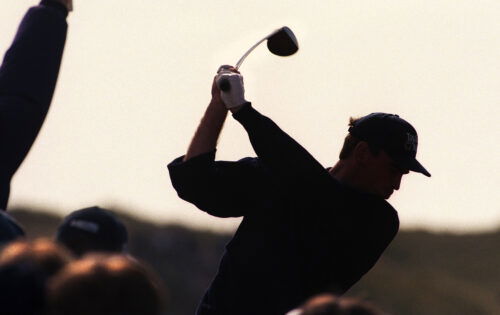Slow play has once again taken center stage in professional golf, and this time it isn’t just fans or analysts weighing in. With six-hour rounds at last month’s U.S. Open and mounting frustration among players, the pace of play is no longer a background gripe; it’s a full-blown crisis.
At Oakmont, the 2025 U.S. Open became a test of endurance. The course’s brutal difficulty—lightning greens, 4-inch rough, and claustrophobic tee shots—slowed play down to a crawl. Groups backed up in clusters. One three-player group took 71 minutes to play three holes. Fans watched as players like Scottie Scheffler and Thriston Lawrence trudged through rounds, pushing the six-hour mark, with 13 competitors failing to even finish Round 2 before darkness halted play.
In the thick of this, the game’s faster players are speaking out. One of the most vocal? New Zealand’s Ryan Fox, fresh off two PGA Tour wins this season and prepping for The Open at Portrush. A self-described fast player, Fox recently sat down on the Sliced Podcast and didn’t hold back on the futility of current pace policies, particularly the idea that fines are enough to fix the problem. “Like, I like the idea of it being reactive. That’s what I try to do, and I think that’s what everyone should try to do: you know, see a target, see a shot, hit it.” Fox credits his fast pace to his sporting upbringing: his father, All Blacks legend Grant Fox, often brought him to corporate golf events as a teen. Being the “extra” in a group, he learned quickly to avoid getting in the way by playing swiftly. That habit stuck, and he’s become one of the quickest players on Tour.
He’s also fed up with the inaction. Despite PGA Tour guidelines giving players 40 seconds to hit once it’s their turn, and 50 if they’re first to play, real enforcement is rare. A group must be out of position before any timing begins, and even then, multiple bad times are needed before penalties apply. The most common punishment? A small fine, often just a few thousand dollars, pocket change for most Tour pros. Fox sees this for what it is: toothless. “But yeah, obviously I know where the rest of it’s going with pace of play, and pace of play is definitely a hot topic in golf at the moment.”
Listen to the full episode with Ryan Fox:
On Spotify: https://t.co/TTg4MCqx2j
On iTunes: https://t.co/xB9rRNhN42
— Sliced Podcast (@slicedpod) July 3, 2025
“Obviously, there are guys that are horrendously slow, and there’s got to be ways to combat that. But then, you know, you look at something like Oakmont for the U.S. Open—there’s not a lot you can do for pace of play there.” He’s not alone. Players like Collin Morikawa, Brooks Koepka, and Justin Thomas have also spoken out, calling for transparency and stroke penalties instead of small fines. On the Korn Ferry Tour and PGA Tour Americas, the PGA Tour has introduced harsher measures this spring: a single bad time now results in a one-stroke penalty. And it’s working. Players like Hunter Wolcott were penalized, then sped up, and even went on to win.
Fox thinks that’s the path forward. “They are getting to a point where docking shots is becoming a viable option—and I think that’s the way you speed guys up. I don’t think fines necessarily do it.” His argument mirrors the shift across golf’s global tours. On the DP World Tour, fines are no longer the norm—two bad times in a week can trigger a two-stroke penalty. LIV Golf does the same. And while the PGA Tour has begun experimenting with new pace-of-play data displays and laser rangefinders at events like the Rocket Mortgage Classic, its main circuit has yet to impose real in-round penalties. Fox’s stance is clear: without stakes at stake, slow play will persist. And yet, even with growing support for stroke penalties, the real-world challenge of enforcing pace at tough venues like Oakmont shows just how complicated the issue remains.
The Oakmont example: When tough setups break the clock
Nowhere has the pace-of-play problem been more glaring than at the 2025 U.S. Open. Oakmont didn’t just expose golfers; it exposed the rules. With its punishing layout, even routine shots turned into stressful decisions. The par-5 12th had five groups stacked behind it at one point.
But the issue wasn’t just the course; it was the lack of teeth in the rules. Despite Tour guidelines aiming for rounds under 4.5 hours, some groups were clocking in at 5:45. No penalties were issued. Even the broadcast teams were stunned. One Golf Channel commentator called it “soul-destroying.”
Scottie Scheffler, who played one of the slowest rounds, admitted there was nothing he could do—“Too many concerns other than the pace,” he said. The tournament effectively became a case study in what happens when course conditions overwhelm policy. Ryan Fox pointed to Oakmont to show why some exceptions are unavoidable. Even the fastest players, he argued, can’t rush when the golf is this hard. But it’s the regular weeks—the standard Tour stops with drawn-out pre-shot routines—where he wants urgency, accountability, and actual deterrents. Fines, he says, don’t cut it. The PGA Tour, already under pressure to adapt, is being pushed to act, and fast.
The post 2x PGA Tour Winner Makes Feelings Clear About Paying ‘Fines’ With Pace of Play Issue appeared first on EssentiallySports.
